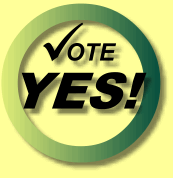
- Home
- Issues
•Background
•News
•FAQs
•Did you know
•Letters
•Photos
•Counterpoint - Links
- How to help
- Contact us
The Lindsay Post is running a weekly series of questions, with answers by both the "Yes" and "No" sides of the issues.
Question #5:If the vote goes your way, how will the lines of communication between local government and citizens work?
Let's break the answer to this question into two parts. The first part will deal with the one year transition period after a "yes" referendum vote. The second part will pick up one year later, after true local democracy has returned with the restoration of Victoria County and the former 16 municipalities.
When Chris Hodgson came to Kawartha Lakes Council last November as Minister of Municipal Affairs, he described the one-year transition period after November 10th. The councillors we elect on November 10th will become a transition Council. Their job will be to complete the process of accounting for the assets and liabilities of the City of Kawartha Lakes and dividing them fairly among the 17 re-created municipalities, including the upper-tier Victoria County.
The transition Council will have one major advantage over the appointed transition board which helped to create the City of Kawartha Lakes three years ago: they will have been elected. Elected bodies work best when subjected to public scrutiny. That's where the lines of communication come into the picture.
Before amalgamation, councillors were directly answerable to their constituents. So should it be after November 10th. Councillors have telephones and e-mail. Use them. Councillors will no longer have to say, "I'm a policy maker only. Talk to staff if you have a problem."
Councillors, the good ones at least, are approachable. Approach them with your questions and concerns. A "yes" vote will create a system of local governance that works best for ourselves. Get involved. Write letters to the editor. Come to meetings of the transition Council. It's your government.
The second part of the question covers the period after the transition Council has completed its work. At this point Fenelon Falls and Somerville Township and Omemee and Sturgeon Point will have been reborn as more than just names on a map. They will govern their own affairs in the interests of their own residents through locally elected councils. They will set their own tax rates and determine their own service levels.
Local ratepayers will communicate directly with their elected councils, councillors, and the knowledgeable staff behind the counter at the town hall. The maze of bureaucracy with its policy and procedure manuals will be a thing of the past. Every dollar in the municipal budget will matter because the ratepayers will be watching. Never again will we hear a councillor say, "We're a hundred million dollar corporation," or "My responsibility is to the City of Kawartha Lakes."
Issues which overlap all of the re-created sixteen municipalities will again be dealt with at the County, or upper-tier level. Now, however, it will be on a drastically scaled-back level from the City of Kawartha Lakes monster.
Here's a question that wasn't asked: "How will the lines of communication between local government and the citizens work before the referendum vote?" Why this is important is because we are electing a Council that might have either a one year mandate or a three year mandate. A "yes" vote means that your councillor will have a dual role. He or she will be responsible for good government during the wind-down of the short-lived and unlamented City of Kawartha Lakes. And he or she will be responsible for rebuilding in an orderly fashion Victoria County and the former sixteen municipalities.
As would-be councillors declare their candidacies, ask them how they see their role depending on the outcome of the vote. Anyone running for office will have to be prepared to be a two-way player, in the game for the long or short haul. Ask the question and be prepared to judge the candidate by the answer.